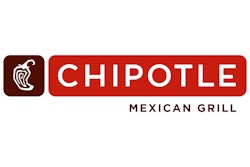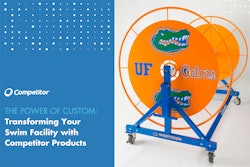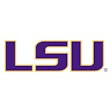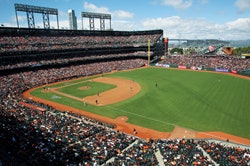
Russ Stanley's phone was ringing off the hook. It was Aug. 7, 2007, and calls were pouring into the San Francisco Giants' ticket office hours before Barry Bonds was to take the field for a Tuesday night game against the Washington Nationals. Bonds had just tied Henry Aaron's all-time Major League Baseball home run record during a weekend trip through San Diego.
Months earlier, a 24-year-old economics Ph.D. named Barry Kahn had tried to convince Stanley, the Giants' managing vice president of ticket services and client relations, that the price of tickets to sporting events should be allowed to change with market conditions, and that he had the software solution to make it happen. "It sounded like it made a lot of sense," says Stanley, an 18-year veteran of the Giants organization at the time. "You know, the price of strawberries goes up when there's a drought. It made sense in the airline and hotel business. But I didn't really think that sports was quite ready for that. Sports is very conservative."
This, from an MLB club that was among the first to roll out variable pricing, charging more per ticket beginning in 2001 for weekend games because they tended to sell out the quickest. Still, the Giants weren't ready for the kind of dynamic pricing being pitched by Kahn, the founder and CEO of Austin, Texas-based Qcue, who envisioned ticket evaluations and pricing adjustments made in real time. That is, "until I was sitting here the night that Bonds hit 756," Stanley says. "We sold about 10,000 tickets that day. We were selling tickets in the upper deck for $10, and every upper-deck seat was the same price. I sat back and said, 'Okay, now I get what the kid's talking about.' I could have charged $100 a ticket and we still would have sold them all out. A light bulb went on."
San Francisco became the first of 15 MLB clients to use Qcue's market analytics to more accurately match ticket prices with what the immediate market will bear. In 2008, the Giants tested the software's pricing recommendations, which are based on variables ranging from ticket availability to weather conditions, without actually adjusting prices, and found that fluctuation goes both ways. "One of the games we were looking at was a late-season Dodger game, and neither team was very good that year," Stanley recalls. "We were charging $32 for that ticket, and what we found was that the ticket was really worth $28. We ended up really struggling to get that game sold out. What I learned from that was when you set your price in October for a game that's being played the following September, you may be close, but it would be nice to be able to make some corrections as you go along."
Corrections are not exactly new to ticket pricing. It's the "as you go along" part that is gaining widespread acceptance among teams and even fans. "If you think about the value of a ticket - what someone's willing to pay for it - that has always changed," says Doug Lyons, vice president for marketing and communications at Tickets.com. "In other words, if you price your tickets too high, they don't sell, and so what people would traditionally do back in the old days is offer discounts: 'Let's put out a special offer, 20 percent off, and see if we can sell them that way.' That, in essence, is dynamic pricing. The difference now is that dynamic pricing is more proactive. Rather than reacting - some human being looking and saying, 'Oops, we're not selling. Let's adjust the price' - it's more of a proactive monitoring not only of the sales environment but what the circumstances of a particular event might be."
And there is no shortage of circumstances, which (for now, at least) has led inventory management sites like Tickets.com to leave dynamic pricing intelligence to niche software providers such as Qcue, Digonex and StratBridge. Says Lyons, "The third-party companies take all that data from the ticketing system - tickets sold, tickets unsold, the rates at which tickets sold - and then marry that up with other things like weather or even potential construction traffic around the stadium to come up with what they feel is the true demand price for that particular game."
While NBA and NHL teams have experimented with dynamic pricing, MLB clubs, with their massive ticket inventory and rotating pitching matchups, have embraced the concept in greater numbers. "When tickets originally go on sale for the season, you don't know who's pitching on a given night in June," Lyons says. "But as that game gets closer and two hot pitchers are going to start, you know that demand for remaining tickets is going to go up because of that matchup. So you can proactively raise the prices before people buy tickets to capture more of that revenue."
Stanley is not alone when comparing sports ticketing to the airline industry, but it's a bit of a false analogy. There is no secondary market - no StubHub - for airline tickets. Sports tickets not only have a life after purchase, the sporting events themselves, unlike most flights, offer a wider variety of seating experiences, a finite number of desirable matchups on any season's schedule and a lack of competition - in most cases, only one team representing a given sport per city offers such events. Dan Meehan, Qcue's director of pricing and operations, offers another difference when he says, "Travelers tend to follow more predictable patterns - leisure travelers buy earlier, and business travelers buy later - whereas diehard sports fans might pay more to guarantee a seat up front or wait until the last minute and pay whatever it takes to get the best seat that remains."
The secondary ticketing market - from scalpers illegally hustling inventory on the street to legitimate fan-to-fan resale sites (the Giants launched the "Double Play Ticket Window" for their fans in 2000, before StubHub even existed) - has long kept a major player out of the enhanced-revenue game: the team putting the product on the field. Dynamic pricing changes that. "You're controlling the secondary market," says Ashwin Puri, who joined the University of California athletic department six months ago after stints with the New Jersey Nets, the New York Jets and the NBA. "You're not letting the brokers determine how people can get your tickets. You're pricing them accordingly and taking advantage of what the brokers are getting. So you're kind of sharing in that secondary-market opportunity. It just depends on how aggressive the athletic department or the professional sports organization wants to be with this."
Cal hired Puri to, as he puts it, "professionalize" the athletic department. It will consult Qcue data on a daily basis and adjust ticket prices as it sees fit. Immediately after tickets to the 115th Big Game against Stanford went on sale during the first week of August, prices saw their first $10 bump, to $75, and that game won't be played until Oct. 20. "It's all based on supply and demand," Puri says. "Qcue gives us a recommendation based on secondary market data, as well as the inventory available, and it says, 'Hey, you should price up $20,' or whatever. We ultimately make the determination. It's not done automatically. So we take the data in, we analyze it. We check in every hour, every minute, once a day, once a week - it just depends on how aggressive an organization is."
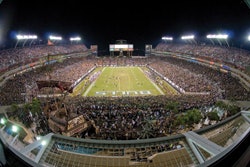
Though the University of South Florida checks ticketing intelligence less aggressively, usually two or three times per week, it can still lay claim to being the first collegiate entity to experiment with dynamic pricing. Ayodele Taylor-Dixon, assistant director of athletics for marketing and revenue development, had consulted with Qcue and Digonex (USF's chosen provider, ultimately), as well as the Minnesota Twins, the Anaheim Ducks and the Charlotte Bobcats, before concluding that the concept "would eventually spill over into the college space." For the Bulls, who have played Division I football for fewer than a dozen years, the spillover began last season with what Taylor-Dixon terms "tweaks" to football ticket pricing - "maybe a dollar here, a couple dollars there."
"For a lot of years, I think a lot of us on the college athletics side have just looked at our prices and looked at our peers and made a guess - 'I think our market can support this, and from a budget perspective we can make this work, so these are our prices,' " he says. "Why not use some data from people who are smarter than us and who look at all the factors, and then make a decision?"
Digonex not only recommends whether clients should price up, down or hold the line, "it's going to give you a guesstimation on how many tickets you can expect to sell between now and the next time you receive pricing information," Taylor-Dixon says. "Let's say I got a report today and I was going to get another one tomorrow. They might say we're going to sell 100 tickets of this type by tomorrow before we receive pricing information again. And so you get a real good read when looking at your whole building: 'Okay, this is what they're projecting in all these price categories.' "
Taylor-Dixon adds that South Florida never adjusted ticket prices downward last season. "At times they gave us recommendations to go up and we didn't go up, just because at the beginning we were kind of just trying to read everything and make sure that we were understanding everything correctly," he says. "The other piece of this that became a deciding factor for me is at the end of the day, when comparing all of this information, you make the final decision on whether you're going up or down. I think being able to have that final say kind of helped us to say, 'Well, why not try this? If we don't like what we're seeing, we don't have to make any changes.' "
"I'm surprised that more schools don't take advantage of dynamic pricing," says Puri, who cites three reasons to do so: monetizing high-demand games and pricing low-demand games appropriately in the interest of selling them out, providing value for established season-ticket holders by ensuring they get the lowest price available on high-demand games, and leveraging that value to up-sell single-game ticket buyers into partial- or full-season plans. "It's really leveraging the people who want to come once and having them reconsider that approach so as to join us for a larger commitment," Puri says. "And then it helps us, obviously, if we service them well and steward them. Someday down the road, our next major gift could come from someone buying a partial plan today. You just don't know."
Puri is at least wary of the risk in reducing prices for single-game tickets to levels below the face value of season tickets, thus undercutting Cal's most committed customers. "We're attempting to set floors to make sure season-ticket holders always have paid the best price," he says. "But, you know, we're not guaranteeing that."
Protecting the Giants' season-ticket base (27,000 patrons strong) was Stanley's greatest concern as he explored dynamic pricing five years ago. To keep all constituents happy, the Giants varied game prices within each season-ticket package (suggesting four levels of market value to the holder depending on the matchup versus one per-game price representing the average of 81 total). Moreover, AT&T Park has seating sections where season tickets aren't sold at all, allowing for tickets on occasion to be blown out for $5 apiece during so-called "Dynamic Deals." (But even that bargain-basement price has been adjusted over time, to $8.)
Conversely, will the average single-game ticket buyer feel gouged when prices go up? "In fact, one of the debates is whether we even want to draw the attention of Joe Public that this is happening," Lyons says. "We haven't kept it a secret, but teams generally sort of just let it happen organically. In other words, it automatically appears in all channels. So if fans go to the box office and ask for a ticket, the gate price will be reflective of whatever the dynamically determined price is for that day. If they go online that day, the same thing will happen. Whatever the going rate is, that will be reflected, because the data from these third-party partners can be pushed immediately on an integrated basis."
"One of the things I was anxious to see is if we would hear people complain about some pricing, and it never happened. Not once," says USF's Taylor-Dixon. "I think the secondary market is a lot bigger than all of us probably know, and I think the single-game buyers are used to pricing being all over the place."
For that matter, there's no one-size-fits-all format for dynamic pricing. "This is one of the common misconceptions about dynamic pricing - that it's a standard algorithm that processes the same data in the same way for every client," says Qcue's Meehan. "Each team we work with has its own individual goals - typically balancing increasing revenues with attendance objectives and giving fans a better overall experience, including things as granular as enticing people to sit in certain parts of the ballpark or arena. The day-to-day factors such as the opposing team play into that but are just a small piece of an overall cohesive business strategy that we work on with our clients throughout the year, even when games aren't being played."
Does dynamic pricing, in fact, work for the client? Qcue's longest-running partner thinks so. The Giants saw increases in overall ticket revenue of seven percent in 2010 and eight percent in 2011, and are on pace to see an eight percent increase again this season - substantial numbers considering that, as of this writing, AT&T Park has been sold out every game this season and most of last. And that doesn't even take into account the concessions, merchandise and parking revenue realized by putting fans in every available seat, no matter how much some tickets may be discounted. "Keeping the streak alive is great," Stanley says. "So is knowing that maybe we have a little bit of input on what players we're able to sign. Because we're able to keep generating above our revenue target, maybe we can impact what happens on the field.
"I believe this run that we've had is because we're able to find the right price and adjust to what the market will bear on that Monday night against the Padres. If we've missed the mark, we can offer something like a Dynamic Deal in seats where there are no season-ticket holders, and that puts pressure on the rest of the inventory. You can't even get into a movie for $8 anymore. But the thought that you can come see a professional baseball game with a team that won the World Series only two years ago, we think, is a pretty good message."
Ticketing experts agree that dynamic pricing is poised for a run of its own. Meehan believes most colleges will embrace the concept "in the very near future," and Lyons thinks it's only a matter of a season or two before all MLB teams are on board. "The notion was proven by the secondary market years ago, that after you first price a ticket, circumstances change, and the value of that ticket does, in fact, change over time," Lyons says. "That's just a fact of life, of economics. And you can't put the genie back in the bottle. The secondary market was created to take advantage of that. Everyone now knows that tickets are a commodity."
Even fans. "I think people understand," says Stanley, whose personal light bulb was lit that August afternoon five years ago. "They get it."




















